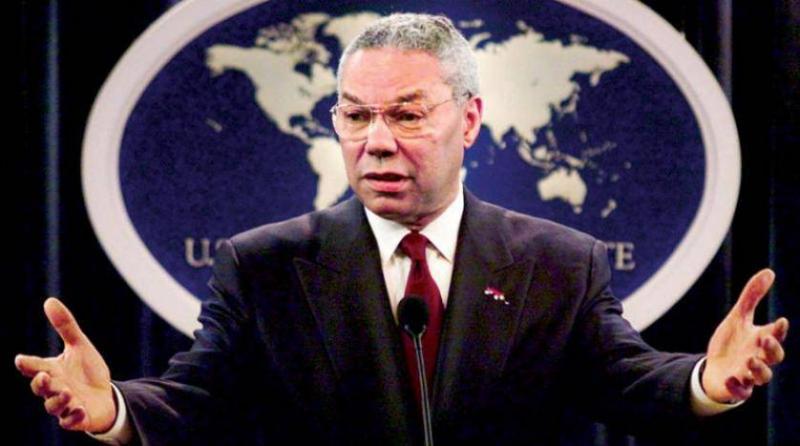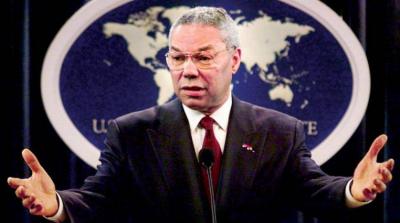Colin Powell's legacy, who passed away yesterday at the age of 84 due to complications from COVID-19, is overshadowed by his image at the United Nations Security Council when he served as Secretary of State, presenting evidence—which later turned out to be incorrect or misleading—to justify the 2003 U.S. invasion of Iraq. Notably, he also oversaw the military intervention in 1991 as Chairman of the Joint Chiefs of Staff to expel Iraqi President Saddam Hussein's forces from Kuwait. Powell’s family announced on social media that he died after contracting COVID-19, despite being fully vaccinated. They stated: "We have lost a wonderful and loving husband, father, grandfather, and a great American." Reports indicated that Powell was also fighting a battle with blood cancer.
The wars against Iraqi forces were just parts of the extensive record of an individual who served in both Republican and Democratic administrations, in military, civilian, and diplomatic roles, during times of war and peace for over 40 years. In addition to the Gulf War, also known as "Operation Desert Storm," Powell—being the first African American Chairman of the Joint Chiefs of Staff—led the invasion of Panama at the beginning of this mission in 1989. However, his most notable moment came when he became the first African American Secretary of State to attend a session of the UN Security Council on Iraq, presenting a series of false claims regarding Saddam Hussein's alleged weapons of mass destruction. These were among the 28 international crises that Powell dealt with, and he was also the first African American National Security Advisor.
Born to Jamaican parents in Harlem, New York, Powell grew up and was educated there. In his autobiography published in 1995 titled "My American Journey," he wrote that "my story is that of a Black child with no early promise from a resource-limited immigrant family." He detailed how he volunteered for the army after the military abandoned racial discrimination. He received awards for his participation in the Vietnam War. President Reagan appointed him National Security Advisor at the end of the Cold War, where he helped negotiate arms treaties and facilitated an era of cooperation with the last Soviet leader, Mikhail Gorbachev.
During his tenure as Chairman of the Joint Chiefs from 1989 to 1993, Powell worked closely with then-Defense Secretary Dick Cheney to reshape the U.S. military, which had remained on high alert at the Iron Curtain for half a century. Thus, he stamped his mark on the "Powell Doctrine" concerning military operations, which stipulated that they should have clear political objectives, enjoy popular support, and utilize decisive force to defeat enemy forces.
Many believe this doctrine was less applicable to the conflicts that arose in the Balkans during the 1990s or to counter-terrorism in a world transformed after the September 11, 2001 attacks on the United States. Nonetheless, he was the first U.S. official to accuse the Al-Qaeda organization, led by Osama bin Laden, of these terrorist attacks. In fact, he made a swift trip to Pakistan in October 2001 to urge then-President Pervez Musharraf to cooperate with the United States.
However, Powell remained steadfast in his beliefs. When asked by the New York Times in 2007 to provide an analysis of himself, he stated: "Powell is capable of solving problems. He learned as a soldier to solve problems. So he has opinions, but he is not an ideologue. He has passion but is not a zealot. He is above all capable of solving problems."
Despite the scars on his legacy due to his appearance before the Security Council in 2003 to justify the U.S. war against Iraq and his presentation of incorrect information about Saddam Hussein's concealing weapons of mass destruction, Powell stated in a 2012 interview with the Associated Press: "I believe we have accomplished a great deal in Iraq," adding, "the horrible dictator of Iraq has gone." During his UN speech, Powell displayed a small vial that he claimed contained a biological weapon, later referred to as "anthrax powder." He later mocked this incident as a low point in his career, asserting that it was based on poor intelligence assessments.
Powell, who had an affection for calypso music, faced criticism from singing legend Harry Belafonte, who likened him to a "house slave" due to the decision to invade Iraq. However, Powell refrained from entering a public dispute with Belafonte, clarifying that he was not a fan of Belafonte and preferred calypso star Mighty Sparrow from Trinidad.
Although he rose to national prominence under Republican presidents, Powell distanced himself from this partisan identity, ultimately separating from the Republican Party. He supported Democrats in the last four presidential elections, starting with former President Barack Obama. He explicitly criticized former President Donald Trump, describing him as a "national disgrace" who should have been impeached. After the Capitol riot on January 6 of last year, Powell stated that he no longer considered himself a Republican.




